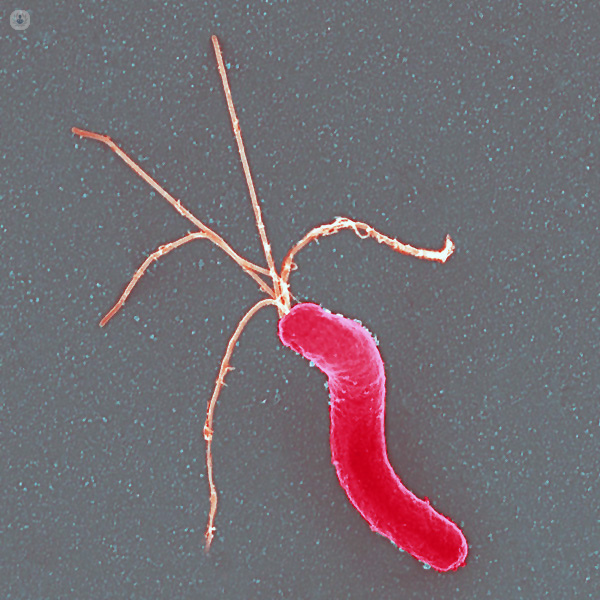Helicobacter pylori – ask an expert!
Written in association with:Helicobacter pylori (often called HP for short) is a bug or bacterium that lives in the stomach. It was discovered in the 1980s by an Australian surgeon called Barry Marshall, who was awarded the Nobel Prize in 2005 with his collaborator Robin Warren for discovering the link between HP and peptic ulcers (peptic ulcers are defects in the in the lining of the stomach or an adjacent part of the intestine called the duodenum).
There is still much we don’t know about helicobacter pylori, but it lives in the stomachs of a huge number of people. Top Doctors talked to expert gastroenterologist Professor Stuart Bloom, who gives us the facts about this gut condition.

What is helicobacter pylori?
Helicobacter pylori lives in the stomach and has been infecting people for a long time. It was only identified as an important cause of human disease in the mid-1980s when a young Australian surgeon called Barry Marshall identified it in the mucus layer lining the stomach. He became convinced that it was a major factor in stomach inflammation and peptic ulcer disease; it was only after he swallowed a culture of the bacterium, developed an ulcer and then cured the ulcer with antibiotics did the scientific community begin to accept that a disease which had caused so much suffering was in the majority of cases caused by an infection.
Where does H. pylori come from?
Most people acquire H. pylori by infection from other people, usually close family members. Infection usually occurs in childhood. About 40 per cent of people living in the UK have HP in their stomach. The bug often lives in the stomach for many years without causing problems – about 80 per cent of people infected with the bug do not have symptoms.
When is H. pylori serious?
The reasons why HP can cause stomach ulcers after many years of living in a host organism (person) are not clear. Infection causes inflammation in the stomach and this can cause high levels of an acid-producing hormone called gastrin. Over time, raised acid levels can cause various symptoms including indigestion, and more worryingly, stomach and duodenal ulcers.
Problems can arise due to the combination of H. pylori and other ulcer-causing factors, such as some drugs (for example, non-steroidal anti-inflammatories (NSAIDs)). Ulcers occurring in the stomach or duodenum are called peptic ulcers. Not only can they cause symptoms, but can be subject to complications, such as bleeding or even perforation.
There is also an association between H. Pylori and stomach cancer, which is why HP is treated in most people who are shown to be infected, even if they have very few symptoms.
How do we test for H. pylori?
It is possible to test for Helicobacter pylori by a blood test or a breath test, but now the most accepted way is to test stool (faeces) for a marker of H. pylori called HP antigen. The reason for this is that a blood test for H. pylori will remain positive even after treatment, while a stool test picks up active infection.
It is also possible to test for HP when doing an endoscopy, or even to grow the bacteria directly in a laboratory after a biopsy, but these tests are more expensive and invasive. Usually your doctor will advise avoiding strong acid suppressant drugs (proton pump inhibitors of PPIs) for about 3 weeks before being tested for HP.
Is there a cure for H. pylori? What is the treatment?
In most cases HP can be eradicated with a mixture of antibiotics and acid suppression. As with many infections, antibiotic resistance is a considerable problem and affects eradications rates. 20 years ago, we thought we had solved the problem with a regimen of seven days of two antibiotics and an acid inhibitor. Nowadays, this cocktail is very often ineffective and we are having to use longer treatments of a combination of antibiotics.
Currently, eradication rates are of the order of 90 per cent. In theory, the bacterium can be grown in the laboratory from a biopsy taken at the time of endoscopy and its sensitivity to different antibiotics can be measured, but in practice it is rather difficult to grow in laboratory conditions.
Does it come back?
Not very often. Once HP is eradicated by antibiotics, recurrence is rare, and can be tested for by a breath test of a stool HP antigen.


